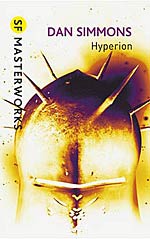
![]() nottheone
nottheone
7/4/2016
![]()
About 20 years ago, when I first read this book, its effects were galvanizing. Rereading it now only confirms that my memory has not deceived me: this is simply an incredible novel. In the first 20 pages, Simmons lays out the entire plot: a group of people are traveling to the planet Hyperion to see a religious figure shrouded in mystery, as enemy ships implacably arrow toward that same planet. Neither the characters nor the reader knows why these people have been "chosen" to make this pilgrimage, setting up an intense curiosity. Who are these people? Who/what is the Shrike? Who are the Ousters? The reader is already turning the pages as fast as possible in search of answers.
Summoning the ghost of Chaucer, Simmons lets the characters answer these questions slowly, as over the course of their trip to Hyperion, each one in turn tells his or her personal story. Each story is different and reveals a bit more information, but for me, the story of the priest is flat out genius. As a stand-alone story, the story of the priest would be counted among the best scifi stories of all time (and I include in that list Nightfall, Weapon Shops of Isher, Microcosmic God, Flowers for Algernon, Scanners Live in Vain).
The other stories are also good, and Simmons does a fairly good job of using a different voice for each one. The warrior Kassad's story is, appropriately, structured around various combat training exercises and actual battles, but these are unexpectedly entwined with an "impossible" love story. The poet's story is full of gorgeous language and riffs about the difficulties of making a life out of writing. I particularly liked the comparison of King Billy with Hrothgar and the Shrike with Gendel (more Olde English Lit peeking through). The story of Sol is just plain heartbreaking. Brawne's story is a combination of detective noir and scifi that struck me as an homage to Asimov. It also owes a debt to Ray Kurzweil and those who argue that humankind, and by extension, our machines, are really just the universe trying to calculate something (but what?). The final story, told by the Consul, was perhaps the least successful. The tale itself was sufficiently complex that telling it out of sequence made it overly confusing.
I had actually forgotten that the book ends quite abruptly after the Consul's tale has been told. I dare anyone who has made it this far not to continue the pilgrimage by picking up the next book, Fall of Hyperion. I know I will be starting it as soon as I post this review.